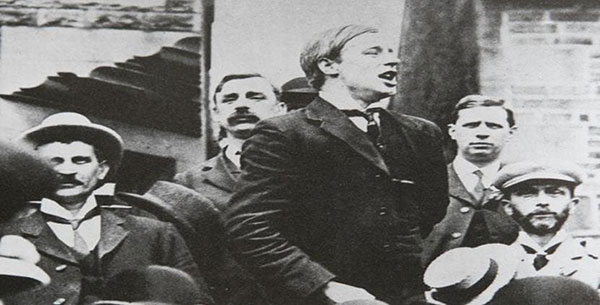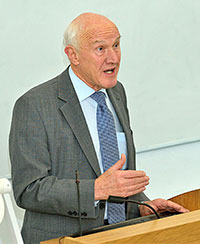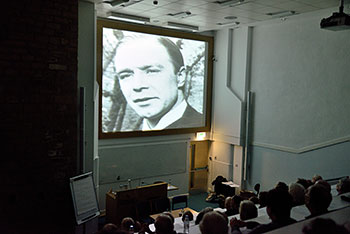The Curious Case of Victor Grayson MP
 Victor Grayson MP who apparently went missing in the 1920s is pictured voicing his opinion to the masses.
Victor Grayson MP who apparently went missing in the 1920s is pictured voicing his opinion to the masses.
Fri, 21 Nov 2014 13:42:00 GMT
Special public screening for the BBC drama-documentary 'The Curious Case of Victor Grayson MP' with Lord David Clark
 Dr Stephen Dorril (stood left), Senior Lecturer at the University of Huddersfield, is pictured with Lord David Clark who gave a lecture after the screening in which he amplified his theories about Grayson, in the context of post-WWI society and politics.
Dr Stephen Dorril (stood left), Senior Lecturer at the University of Huddersfield, is pictured with Lord David Clark who gave a lecture after the screening in which he amplified his theories about Grayson, in the context of post-WWI society and politics.
FASCINATION for the fate of Victor Grayson, an ex-MP who apparently went missing in the 1920s, drew a large audience to a special event at the University of Huddersfield. It featured the first screening in three decades of a BBC drama-documentary about the firebrand socialist, plus a talk by the Labour politician Lord Clark, whose investigations into the fate of Grayson led him to believe that he had been given a secret pension and told to disappear.
Grayson was a superb orator who won the Colne Valley seat in 1907, standing as a socialist. After a short but controversial career as an MP, he lost the seat at the 1910 General Election. After World War One, Grayson lived a flamboyant lifestyle in London, but in September 1920 he was observed leaving his flat with two men and was supposedly never seen again.
Speculation
 It is frequently speculated that Grayson was murdered because he threatened to reveal the details of an honours-selling racket that raised huge sums of money for David Lloyd George. But Lord Clark (pictured left) – who as David Clark was a former Colne Valley MP himself – conducted extensive research and developed a theory that in a post-war Britain where the political establishment was terrified of a Russian-style revolution in Britain, Grayson had in fact been in the pay of Lloyd George and Special Branch, and then turned to blackmail. This provided the funds for Grayson’s lavish lifestyle.
It is frequently speculated that Grayson was murdered because he threatened to reveal the details of an honours-selling racket that raised huge sums of money for David Lloyd George. But Lord Clark (pictured left) – who as David Clark was a former Colne Valley MP himself – conducted extensive research and developed a theory that in a post-war Britain where the political establishment was terrified of a Russian-style revolution in Britain, Grayson had in fact been in the pay of Lloyd George and Special Branch, and then turned to blackmail. This provided the funds for Grayson’s lavish lifestyle.
Eventually, Lord Clark believes, Grayson was given a generous pension, on the condition that he left the country. There were a number of supposed sightings of Grayson overseas and in Britain through to the late 1930s. It was even possible, Lord Clark told his University of Huddersfield audience, that Grayson was still alive, as a very old man, in the 1970s.
This was when Lord Clark – who was a politics lecturer at Huddersfield before embarking on his career as an MP – began the research for his book Victor Grayson: Labour’s Lost Leader, which became the basis of the BBC 2 programme The Curious Case of Victor Grayson MP. It was broadcast just once, in October 1985.But Dr Stephen Dorril – an author and investigative journalist who is now a Senior Lecturer at the University of Huddersfield – was fascinated by the documentary and conducted extensive negotiations to secure permission to give it a special public screening. This took place at the University of Huddersfield event.
 The documentary screening was the prelude to a lecture by Lord Clark in which he amplified his theories about Grayson, in the context of post-WWI society and politics. Then the University’s Professor Keith Laybourn, a leading expert on the history of the Labour movement, discussed Grayson in relation to socialist movements of the early 20th century.
The documentary screening was the prelude to a lecture by Lord Clark in which he amplified his theories about Grayson, in the context of post-WWI society and politics. Then the University’s Professor Keith Laybourn, a leading expert on the history of the Labour movement, discussed Grayson in relation to socialist movements of the early 20th century.
Grayson was an “ethical socialist”, said Prof Laybourn, and the Colne Valley was an ideal setting for his brief political career because of the district’s strong religious traditions.
Lord Clark said that Grayson had been described as having the “mouth of a demagogue and the eyes of a poet”.
“It is now 133 years since Grayson was born and he was an MP for just two-and-a-half years,” said Lord Clark. “But he is still remembered and the fact that so many people have come here tonight, to see a film and hear us talk about him, is quite remarkable.”







